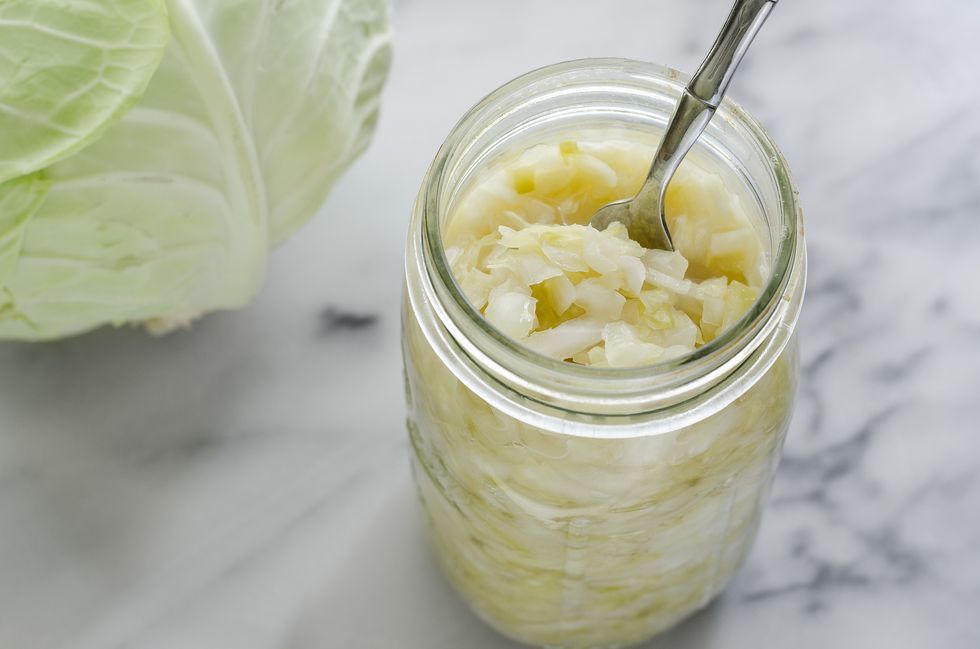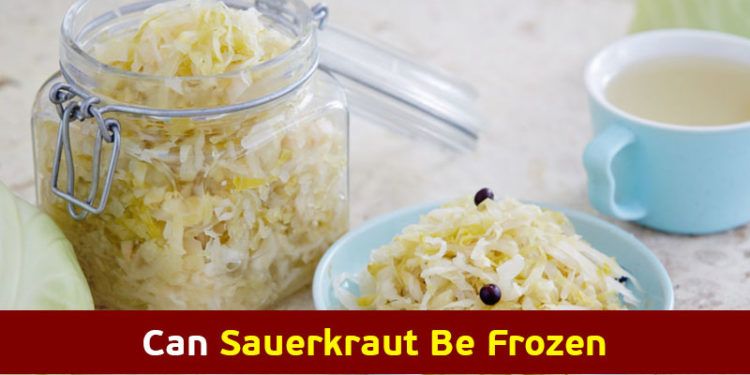Can You Freeze Sauerkraut? Preserving Tradition and Nutrition

Sauerkraut, with its tangy flavor and rich history, is a beloved staple in many culinary traditions. This fermented delight not only adds a zesty kick to dishes but also boasts a range of potential health benefits. But can you freeze sauerkraut without compromising its distinctive taste and nutritional value? Join us as we explore the origins of sauerkraut, its crafting process, the nutritional advantages it offers, and whether freezing this fermented treasure is a viable option.
Unveiling the Origins of Sauerkraut
Defining Sauerkraut
Sauerkraut, a name derived from German words meaning "sour cabbage," is a traditional fermented cabbage dish that has found its way into various cuisines worldwide. It's made by fermenting finely shredded cabbage with salt, allowing the natural sugars to convert into lactic acid through the activity of beneficial bacteria. This process not only imparts sauerkraut's characteristic tanginess but also serves as a natural preservation method.
Crafting Sauerkraut
The crafting of sauerkraut is a simple yet intricate process that involves minimal ingredients – cabbage and salt – and the magic of time. The finely shredded cabbage is mixed with salt, and the pressure applied during the mixing helps to draw out the cabbage's moisture. The salted cabbage is then packed tightly into a container or crock, ensuring there are no air pockets. As fermentation takes hold, lactic acid bacteria proliferate, converting sugars into lactic acid, which not only preserves the cabbage but also imparts sauerkraut's distinct sour flavor.
Nutritional Riches of Sauerkraut
Probiotic Powerhouse
The fermentation process that gives sauerkraut its unique flavor also leads to the creation of probiotics. These beneficial bacteria support gut health and contribute to a balanced microbiome, potentially enhancing digestion and immune function.
Vitamin C Boost
Cabbage, sauerkraut's star ingredient, is a rich source of vitamin C – an antioxidant that aids in immune system function, collagen synthesis, and protection against oxidative stress.
Digestive Enzymes
Sauerkraut's enzymes aid in breaking down food, potentially easing the digestive process. These enzymes can support nutrient absorption and alleviate digestive discomfort.
Low in Calories, High in Fiber
Sauerkraut is a low-calorie food that offers a satisfying crunch and a dose of dietary fiber. This fiber content can contribute to feelings of fullness and support healthy digestion.

Can You Freeze Sauerkraut?
Unfortunately, due to sauerkraut's unique fermentation process, freezing can impact its texture and taste. The freezing and thawing process can cause changes in the cabbage's cellular structure, resulting in a softer texture that deviates from sauerkraut's traditional crunch.
Affect on Nutritional Benefits
While the probiotics present in sauerkraut are sensitive to freezing temperatures, the fermentation process itself creates an environment where these beneficial bacteria flourish. Freezing may slightly diminish the probiotic content, but the initial high concentration developed during fermentation means that even after freezing, sauerkraut can still offer probiotic benefits.
Savoring Sauerkraut's Richness
A Versatile Addition
Sauerkraut's versatility extends beyond being a side dish. It can be used as a topping for sandwiches, a flavorful addition to salads, or even a tangy element in cooked dishes like sausages and stews.
Mindful Pairings
Pair sauerkraut with foods rich in protein, as the acidity can balance the richness of proteins. Consider adding sauerkraut to plant-based meals for a burst of flavor and nutritional depth.
Sauerkraut Meal Ideas
Sauerkraut's influence reaches beyond its nutritional merits; it embodies the preservation of culinary traditions and the art of transforming humble ingredients into a culinary treasure. Here are a few more insights into how to enjoy sauerkraut's distinct qualities:
- Sandwich Savior: Elevate your sandwiches by adding a layer of sauerkraut. Its tangy crunch can complement the textures and flavors of meats, cheeses, and spreads.
- Brighten Up Salads: Incorporate sauerkraut into salads to introduce a lively burst of flavor. Its acidity can balance the richness of dressings and add a zing to leafy greens.
- Creative Cookery: Experiment with sauerkraut in various cooked dishes. Add it to stir-fries, use it as a topping for baked potatoes, or even blend it into savory pancake batters for a unique twist.
Choosing the Right Sauerkraut
When selecting sauerkraut, consider the following tips:
- Check Ingredients: Opt for sauerkraut that lists only cabbage and salt as ingredients. This ensures a more authentic and traditional product.
- Live Culture: Look for unpasteurized sauerkraut that contains live cultures. This indicates that the probiotic content is more likely to be present.
- Texture Preference: If you enjoy sauerkraut's natural crunch, consuming it fresh is recommended. For recipes where texture is less critical, using sauerkraut that has been previously frozen can be a convenient option.
Conclusion
"Can you freeze sauerkraut?" This question reveals the dynamic interplay between preservation methods and culinary experience. While freezing sauerkraut may alter its texture and slightly affect its probiotic content, it remains a testament to tradition, craftsmanship, and nutritional value. Whether enjoyed fresh for its signature crunch or frozen for the sake of convenience, sauerkraut's essence persists – a celebration of the fermentation process that transforms cabbage into a tangy and healthful delight.
As you embark on your sauerkraut journey, remember that the choice to freeze or not to freeze is a personal one. Regardless of the path you choose, the heart of sauerkraut's charm lies in its ability to connect you to culinary traditions, enrich your meals with distinctive flavor, and offer potential health benefits that stem from the intricate dance of fermentation.
Want more new food ideas? Check out "Is Miso Soup Gluten Free?"